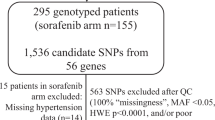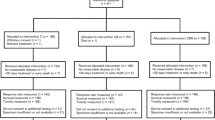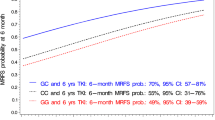Abstract
No biomarkers are available to predict toxicities induced by VEGFR TKIs. This study aimed to identify markers of toxicities induced by these drugs using a discovery-validation approach. The discovery set included 140 sorafenib-treated cancer patients (TARGET study) genotyped for SNPs in 56 genes. The most significant SNPs associated with grade ≥2 hypertension, diarrhea, dermatologic toxicities, and composite toxicity (any one of the toxicities) were tested for association with grade ≥2 toxicity in a validation set of 201 sorafenib-treated patients (Alliance/CALGB 80802). The validated SNP was tested for association with grade ≥2 toxicity in 107 (LCCC 1029) and 82 (Italian cohort) regorafenib-treated patients. SNP-toxicity associations were evaluated using logistic regression, and a meta-analysis between the studies was performed by inverse variance. Variant rs4864950 in KDR increased the risk of grade ≥2 composite toxicity in TARGET, Alliance/CALGB 80802, and the Italian cohort (meta-analysis p = 6.79 × 10−4, OR = 2.01, 95% CI 1.34–3.01). We identified a predictor of toxicities induced by VEGFR TKIs.
ClinicalTrials.gov Identifier:
NCT00073307 (TARGET), NCT01015833 (Alliance/CALGB 80802), and NCT01298570 (LCCC 1029).
This is a preview of subscription content, access via your institution
Access options
Subscribe to this journal
Receive 6 print issues and online access
$259.00 per year
only $43.17 per issue
Buy this article
- Purchase on Springer Link
- Instant access to full article PDF
Prices may be subject to local taxes which are calculated during checkout


Similar content being viewed by others
Data availability
The datasets generated during and/or analyzed during the current study are available from the corresponding author on reasonable request.
References
Qin S, Li A, Yi M, Yu S, Zhang M, Wu K. Recent advances on anti-angiogenesis receptor tyrosine kinase inhibitors in cancer therapy. J Hematol Oncol. 2019;12:27.
Deng H, Liu W, He T, Hong Z, Yi F, Wei Y, et al. Comparative efficacy, safety, and costs of sorafenib vs. sunitinib as first-line therapy for metastatic renal cell carcinoma: a systematic review and meta-analysis. Front Oncol. 2019;9:479.
Yin X, Yin Y, Shen C, Chen H, Wang J, Cai Z, et al. Adverse events risk associated with regorafenib in the treatment of advanced solid tumors: meta-analysis of randomized controlled trials. Onco Targets Ther. 2018;11:6405–14.
Schmidinger M. Understanding and managing toxicities of vascular endothelial growth factor (VEGF) inhibitors. EJC Suppl. 2013;11:172-91.
McLellan B, Ciardiello F, Lacouture ME. Regorafenib-associated hand-foot skin reaction: practical advice on diagnosis, prevention, and management. Ann Oncol. 2015;26:2017–26.
Crona DJ, Skol AD, Leppanen VM, Glubb DM, Etheridge AS, Hilliard E, et al. Genetic variants of VEGFA and FLT4 are determinants of survival in renal cell carcinoma patients treated with sorafenib. Cancer Res. 2019;79:231–41.
Glubb DM, Paré-Brunet L, Jantus-Lewintre E, Jiang C, Crona D, Etheridge AS, et al. Functional FLT1 genetic variation is a prognostic factor for recurrence in stage I-III non-small-cell lung cancer. J Thorac Oncol. 2015;10:1067–75.
Song Y, Fu Y, Xie Q. Anti-angiogenic agents in combination with immune checkpoint inhibitors: a promising strategy for cancer treatment. Front Immunol. 2020;11:1956.
Schmidinger M, Danesi R. Management of adverse events associated with cabozantinib therapy in renal cell carcinoma. Oncologist. 2018;33:306–15.
Qin F, Yu H, Xu C, Chen HH, Bai JL. Safety of axitinib and sorafenib monotherapy for patients with renal cell carcinoma: a meta-analysis. J Biomed Res. 2018;32:30–38.
Rizzo A, Nannini M, Novelli M, Dalia Ricci A, Scioscio VD, Pantaleo MA. Dose reduction and discontinuation of standard-dose regorafenib associated with adverse drug events in cancer patients: a systematic review and meta-analysis. Ther Adv Med Oncol. 2020;12:1758835920936932.
Escudier B, Eisen T, Stadler WM, Szczylik C, Oudard S, Siebels M, et al. Sorafenib in advanced clear-cell renal-cell carcinoma. N Engl J Med. 2007;356:125–34.
Lee S, Abecasis GR, Boehnke M, Lin X. Rare-variant association analysis: study designs and statistical tests. Am J Hum Genet. 2014;95:5–23.
Abou-Alfa GK, Shi Q, Knox JJ, Kaubisch A, Niedzwiecki D, Posey J, et al. Assessment of treatment with sorafenib plus doxorubicin vs sorafenib alone in patients with advanced hepatocellular carcinoma: phase 3 CALGB 80802 randomized clinical trial. JAMA Oncol. 2019;5:1582–8.
Sanoff HK, Goldberg RM, Ivanova A, O’Reilly S, Kasbari SS, Kim RD, et al. Multicenter, randomized, double-blind phase 2 trial of FOLFIRI with regorafenib or placebo as second-line therapy for metastatic colorectal cancer. Cancer 2018;124:3118–26.
Falcone A, Cremolini C, Loupakis F. Pharmacodynamic and analysis of angiogenesis-related factors during regorafenib therapy for metastatic colorectal cancer: the REGOLAND project. www.fondazionearco.org 2015.
Machiela MJ, Chanock SJ. LDlink: a web-based application for exploring population-specific haplotype structure and linking correlated alleles of possible functional variants. Bioinformatics 2015;31:3555–7.
Kent JW, Sugnet CW, Furey TS, Roskin KM, Pringle TH, Zahler AM, et al. The human genome browser at UCSC. Genome Res. 2002;12:996–1006.
Boyle AP, Hong EL, Hariharan M, Cheng Y, Schaub MA, Kasowski M, et al. Annotation of functional variation in personal gnomes using RegulomeDB. Genome Res. 2012;22:1790–7.
Ward LD, Kellis M. HaploReg: a resource for exploring chromatin states, conservation, and regulatory motif alterations within sets of genetically linked variants. Nucleic Acids Res. 2012;40:D930–4.
GTEx Consortium. The genotype-tissue expression (GTEx) pilot analysis: multitissue gene regulation in humans. Science 2015;348:648–60.
Wilhelm SM, Dumas J, Adnane L, Lynch M, Carter CA, Schütz G, et al. Regorafenib (BAY 73-4506): A new oral multikinase inhibitor of angiogenic, stromal and oncogenic receptor tyrosine kinases with potent preclinical antitumor activity. Int J Cancer. 2011;129:245–55.
Abhinand CS, Raju R, Soumya SJ. VEGF-A/VEGFR2 signaling network in endothelial cells relevant to angiogenesis. J Cell Commun Signal. 2016;10:347–54.
Sherry ST. dbSNP: the NCBI database of genetic variation. Nucleic Acids Res. 2001;29:308–11.
De Mattia E, Cecchin E, Guardascione M, Foltran L, Di Raimo T, Angelini F, et al. Pharmacogenetics of the systemic treatment in advanced hepatocellular carcinoma. World J Gastroenterol. 2019;25:3870–96.
Qin C, Cao Q, Li P, Wang S, Wang J, Wang M, et al. The influence of genetic variants of sorafenib on clinical outcomes and toxic effects in patients with advanced renal cell carcinoma. Sci Rep. 2016;6:200089.
Stein A, Voigt W, Jordan K. Review: chemotherapy-induced diarrhea: pathophysiology, frequency and guideline-based management. Ther Adv Med Oncol. 2010;2:51–63.
Kwakman JJM, Elshot YS, Punt CJA, Koopman M. Management of cytotoxic chemotherapy-induced hand-foot syndrome. Oncol Rev. 2020;14:442.
Lou Y, Wang Q, Zheng J, Hu H, Liu L, Hong D, et al. Possible pathways of capecitabine-induced hand-foot syndrome. Chem Res Toxicol. 2016;29:1591–601.
Funding
Research reported in this publication was supported by the National Cancer Institute of the National Institutes of Health under Award Numbers U10CA180821, U10CA180882, and U24CA196171 (to the Alliance for Clinical Trials in Oncology), UG1CA233373 and UG1CA233290. https://acknowledgments.alliancefound.org. Also supported in part by Bayer Healthcare/Berlex. The content is solely the responsibility of the authors and does not necessarily represent the official views of the National Institutes of Health.
Author information
Authors and Affiliations
Contributions
J.C.F.Q., S.G., and F.I. wrote the manuscript; F.I. designed the research; J.C.F.Q., S.G., A.S.E., A.R., K.H., D.J.C., S.B.J., F.M., D.R., C.C., H.K.S., G.K.A.A., and F.I. performed the research; J.C.F.Q., S.G., A.S.E, A.R., S.B.J., G.K.A.A., and F.I. analyzed the data; C.E.P. contributed new reagents/analytical tools.
Corresponding authors
Ethics declarations
Competing interests
FI is an AbbVie employee and receives stocks from AbbVie; this work was conceived when FI was a faculty at the University of North Carolina at Chapel Hill, and this work does not represent a potential conflict of interest.
Ethics approval
The clinical studies were conducted in accordance with recognized ethical guidelines. The studies were performed in accordance with the Declaration of Helsinki and were approved by the local IRB. All participants provided written informed consent for sample collection and pharmacogenetic analysis.
Additional information
Publisher’s note Springer Nature remains neutral with regard to jurisdictional claims in published maps and institutional affiliations.
Rights and permissions
About this article
Cite this article
Quintanilha, J.C.F., Geyer, S., Etheridge, A.S. et al. KDR genetic predictor of toxicities induced by sorafenib and regorafenib. Pharmacogenomics J 22, 251–257 (2022). https://doi.org/10.1038/s41397-022-00279-3
Received:
Revised:
Accepted:
Published:
Issue Date:
DOI: https://doi.org/10.1038/s41397-022-00279-3
This article is cited by
-
Enzyme-mediated adaptation of herbivorous insects to host phytochemicals
Phytochemistry Reviews (2024)



